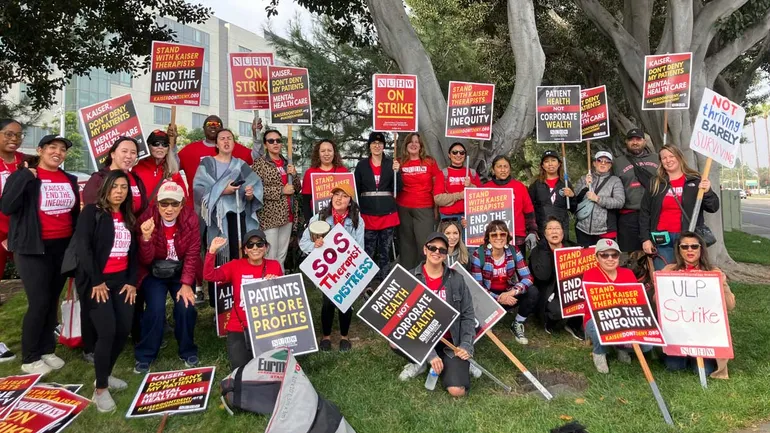Dive Brief:
A group of California state senators and California Assembly Speaker Robert Rivas are urging Kaiser Permanente CEO Greg Adams to take action to end a nearly 2,400-worker strike in Southern California.
In a pair of letters sent last week, the representatives said Kaiser has canceled “large numbers” of behavioral health appointments since workers began striking in October, and warned the reduction in services was having an adverse impact on patient care.
The representatives pushed Kaiser to resume efforts to negotiate a contract. Labor and management have not met at the bargaining table in more than seven weeks. As of Monday, no bargaining sessions were scheduled for this week, according to a spokesperson for the National Union of Healthcare Workers, which is representing the employees.
Dive Insight:
The workers are seeking seven hours per week from Kaiser to perform patient duties such as preparing treatment plans or making notes, in addition to changes to their pension plans and pay. Employees say increased preparation time could help prevent clinician burnout and turnover.
“I’m back-to-back all day in appointments,” said Kassaundra Gutierrez-Thompson, a licensed social worker at Kaiser, in an October statement from NUHW. “I have about three minutes to look at my patients’ charts. That’s not enough. Patients are getting burned out therapists who end up leaving because this isn’t what therapy is supposed to be.”
Kaiser’s current offer awards workers up to six hours per week for preparation, training and planning. The health system has also proposed bumping workers’ pay over four years.
The strike marks the second time in two years that behavioral health workers have walked off the job at Kaiser, forcing the nonprofit giant to implement contingency plans for patient care.
In 2022, 2,000 workers in Northern California took to the picket line for 10 weeks in pursuit of more manageable workloads.
However, regulators accused Kaiser of breaking the law after the health system canceled thousands of follow-up therapy appointments during the strike. California law requires health plans, including Kaiser, to provide timely access to care, including follow-up mental health appointments within 10 days. When a health plan cannot offer such care due to a lack of staff, it must help patients find an appointment.
In 2023, Kaiser was ordered to pay $200 million — including a $50 million fine and a pledge to invest $150 million to improve its behavioral health services — to settle claims it violated the law by canceling tens of thousands of appointments during the strike.
Now, the NUHW and state officials say that Kaiser is canceling some patient appointments — potentially in violation of state law again.
In a complaint with the Department of Managed Health Care last week, the NUHW alleged Kaiser had “systematically canceled psychotherapy groups for thousands of enrollees across its Southern California region” since October. Canceled groups include intensive outpatient groups for eating disorders, postpartum depression and post-traumatic stress disorder, according to the complaint.
“It is important to note that Kaiser has not ‘postponed’ its psychotherapy groups, but rather canceled them altogether,” the complaint alleged. “This cancellation is not caused by a work stoppage but by Kaiser’s failure to hire sufficient, licensed replacement staff who are trained to facilitate this type of treatment.”
The California DMHC is overseeing Kaiser’s care delivery during the strike. However, lawmakers expressed concerns that Kaiser’s strike contingency plans are insufficient.
“I have seen the strike contingency plan that Kaiser submitted to DMHC, and I am greatly concerned that the plan does not provide sufficient detail regarding Kaiser’s arrangements to prevent widespread appointment cancellations without timely and appropriate replacement services,” the senators wrote. “I have learned that patient appointments are indeed being cancelled at an alarming rate, and that these cancellations are leading to sometimes indefinite delays, or worse, denials of care.”
Kaiser says that care access for most has been minimally disrupted by the strike, in part due to its relationship with an “external network” of care providers.
“Most of our patients currently work with a provider who is not participating in the strike,” the system said in October, estimating approximately 60% of patients who receive mental health and addiction care services work with a non-striking provider. “For those members who usually receive care from a NUHW-represented therapist, we have been proactively reaching out to them to offer alternative options to meet their needs.”
Kaiser did not return a request for comment by press time. However, on Dec. 6 the system said it had scheduled more than 235,000 appointments for members since the strike began.


